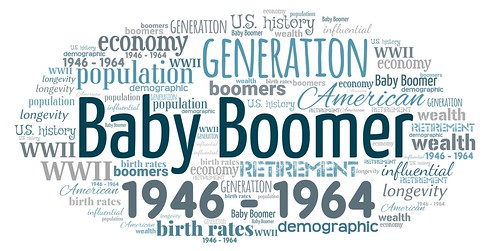by Jerry Cayford
 Boomer-bashing is everywhere. Maybe it’s warranted, but a reality check is in order, because the bashing starts from an easy and false idea about how power has moved in American society. The recent change in House Democratic leadership is almost too perfect an example. As a “new generation” takes power in the top three offices, we quietly ignore the most interesting generational story. We griped about the old guard clinging to power, and we cheer for our new young leaders, but we don’t mention that political power skipped a generation: it passed from the pre-Baby Boom generation to the post-Baby Boom generation. The Boomers themselves were shut out of power. As usual.
Boomer-bashing is everywhere. Maybe it’s warranted, but a reality check is in order, because the bashing starts from an easy and false idea about how power has moved in American society. The recent change in House Democratic leadership is almost too perfect an example. As a “new generation” takes power in the top three offices, we quietly ignore the most interesting generational story. We griped about the old guard clinging to power, and we cheer for our new young leaders, but we don’t mention that political power skipped a generation: it passed from the pre-Baby Boom generation to the post-Baby Boom generation. The Boomers themselves were shut out of power. As usual.
Wait! Before you insist the idea of Boomers shut out of power is ridiculous, that Boomers run the world, that at most the effect would be trivial and the concern petty, let me tell you another story, one whose outlines are well known. My father came out of graduate school in 1963 into the best seller’s market academics have ever seen. The Baby Boomers were just starting to hit college age, and universities were scrambling to hire enough professors to meet this huge wave of incoming students. He waltzed into a tenure-track position at a good university in one of the most desirable cities in the world. A few years later, he got tenure, despite publishing only one paper, not even as lead author (an unthinkable feat in the publish-or-perish jungle I encountered some decades later). He stayed there the rest of his career.
Now, it is no disrespect to my wonderful father, who is smart, a terrific teacher, and a valuable asset to his university, to acknowledge that his career started at an opportune time. Contrast his experience with my sister and her husband’s, smack in the middle of the Boomer generation. The year her husband came out of grad school, there were six openings in his field in the whole country. Universities now faced shrinking enrollment as the Baby Boomers passed college age, but were stuffed with tenured faculty still in their thirties and forties. My brother-in-law got one of those six positions—a one-year, non-tenure-track post—saw the writing on the wall, and used that year to apply to the Foreign Service and a viable career. Read more »
